SAVE BIG when you build your own bundle! Add any 8 individual products to your cart to receive 30% off!

Description
Woodland Wellness Warriors Board Game and Conversation Starters were created to help young people foster hope, optimism, resilience and strength-based practices into their lives. In the line of Positive Psychology and Solution Focused Brief Therapy rather than focusing on what is “wrong,” these wellness activities invite us to pay attention to what is “right,” building on practices that promote well being.
Inspired by the field of Positive Psychology and work of Brené Brown, Kristin Neff, Carol Dweck and Stuart Brown, Woodland Wellness Warriors focuses on the following themes:
*Strengths & Resilience,
*Self-Compassion
*Gratitude
*Grit
*Creativity & Play,
*Connection
*Optimism.
These practices cultivate not only a general sense of well-being, but also have been shown to improve physical & mental health, relationships, and academic success. This game is a great compliment if you are cultivating a trauma-sensitive classroom, helping students with high ACE backgrounds (Adverse Childhood Experiences). It asks questions that encourage students to reflect on their resiliency, connection with others, optimism, strengths, self-compassion, and grit (or growth mindset): critical tools towards a more trauma-informed school.
This 2-in-1 package includes the Woodland Wellness Warrior Board Game, whose questions double as conversation starters. The conversation starters can be doubled for both the Woodland Wellness Warriors question cards and used separately, standing on its own as small small group conversation or even as journal and writing prompts.
Please note: this Woodland Wellness Warrior Board Game and Conversation Starters also come in a BUNDLE with labels to play with JENGA®, and a Woodland Wellness Warrior Board Game and Conversation Starters and
SCOOT classroom lesson and game.
This is not just for school counselors or social workers to use with students, teachers can use these games, activities, and lesson too! Perfect for Fall themes, especially Thanksgiving, as a original component of these activities involves practicing gratitude. Use with counseling groups, individual sessions, and guidance lessons.
**************************************************************************
Quick Tip:
If you would like to receive TPT credit to apply to future purchases:
1) Go to your My Purchases page
2) Next to each of your purchases, click on the Provide Feedback button.
3) Here you can provide a quick rating and brief comment for that item.
Each time you provide feedback, TPT will allocate feedback credits that you can use for future purchases.
I also value your feedback. It helps me to revise products if needed, and acts as a guide to orient me in future creations.
Thank you!
Additional information
| Product Categories | Resilience + Growth Mindset |
|---|---|
| File Type | |
| Grade Level | |
| Used By |

You May Also Like...
Related products
-
Frankel’s WEIRD Trilogy Bundle: Empathy & Bullying School Counseling Lessons
$9.00Original price was: $9.00.$6.30Current price is: $6.30. Add to cart














